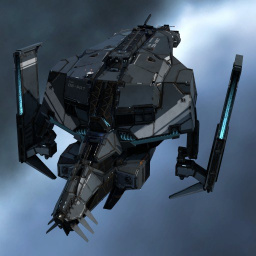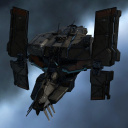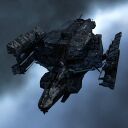
RELATED UNI-WIKI REFERENCES
|
Honor and preserve your family, your corporation, your State.
SHIP BONUSES
Caldari Cruiser bonuses (per skill level):
Ship Attributes
|
Summary
The Osprey is the Tech 1 Caldari logistics cruiser, with bonuses to shield transfers and energy transfers.
Like the Minmatar Scythe, the Osprey is designed to boost other ships' shields. However, unlike the Scythe, and instead like the Amarr armor-repairing Augoror, the Osprey is designed to trade capacitor with other Ospreys in a "capacitor chain". Because of their 200% bonus to energy transfer amount, Ospreys trading energy transfers to each other effectively create a large amount of capacitor out of nothing. A cap-chained Osprey can be capacitor-stable with lower skills than a Scythe, and will also more easily resist energy neutralization. On the downside, a cap-chain team of logistics ships is more vulnerable to ECM, because a jammed Osprey not only can't shield-boost its fellows, but also can't transfer capacitor, reducing its teammates' remote repair capacity. Cap-chained logistics ships also demand more coordination from their pilots.
The Osprey is piloted in a similar fashion to the more powerful Tech 2 Basilisk.
Skills
An Osprey can make a battlefield difference with relatively limited pilot skills, but good general support skills will boost its impact.
Capacitor Management and Capacitor Systems Operation are important for logistics ships. Training in Shield Emission Systems reduces the capacitor burden of remote shield boosters, as Capacitor Emission Systems does for remote capacitor transfer modules. Several skills in the Targeting category are also helpful: Signature Analysis and Target Management make it easier to shuttle between repairing different allies, while Gravimetric Sensor Compensation raises the Osprey's sensor strength, reducing its vulnerability to ECM.
Tactics
The Osprey is typically fitted with a mixture of remote shield boosters and remote capacitor transferrers in its high slots; propulsion, shield tank, and ECCM for jam resistance in the mid slots; and mobility and capacitor aids in the low slots. The exact mixture of modules can be tuned to different character skill levels. The drone bay can be used for logistics drones (unbonused, unlike those of the Scythe), or for damage or ECM drones.
The pilots of Ospreys in a capacitor chain must coordinate carefully before battle, and might benefit from their own logistics comms channel and/or their own logistics commander.
Notes
The osprey is a large bird of prey which, unusually for a raptor, hunts fish.
Patch History
| A long, long time ago... |
|---|
|
October 2019 Release - 2019-10-15.1 Every Cruiser, Battlecruiser and Battleship now warps faster than before.
|





















